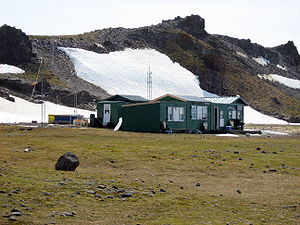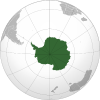Captain Pieter J. Lenie Base
Lenie Station | |
|---|---|
| Captain Pieter J. Lenie Field Station | |
 Copacabana Field Station hut | |
| Nickname: "Copa" Copacabana Field Station | |
Location of Lenie Station in Antarctica | |
| Coordinates: 62°10′42″S 58°26′45″W / 62.1783333°S 58.4458333°W | |
| Country | |
| Location in Antarctica | Admiralty Bay King George Island South Shetland Islands |
| Administered by | United States Antarctic Program |
| Established | 1 January 1985 |
| Named for | Captain Pieter J. Lenie |
| Elevation | 10 m (30 ft) |
| Population (2018) | |
| • Summer | 2 |
| • Winter | 0 |
| Type | Seasonal |
| Period | Summer |
| Status | Operational |
| Activities | Penguins monitoring |
| Facilities | List
|
The Captain Pieter J. Lenie Base is an Antarctic summer base[1] operated by the United States located at Copacabana Beach, Admiralty Bay (King George Island). About two kilometers northwest of this base is the Polish research station Arctowski. Pieter J. Lenie Base, also known as Copa (short for Copacabana), consists of three small buildings at the foot of Rescuers Hills, near Llano Point.[2][3]
The field station is located at a latitude of 62° 10′ S and at a longitude of 58° 28′ W,[4] at Antarctic Specially Protected Area (ASPA) 128.[2] It was originally set up in 1978 as a refuge hut,[2][5][6] and was substantially upgraded and formally named for Pieter J. Lenie (captain of the American Antarctic research ship RV Hero) in 1985.[5][6]
Originally established for the long-term study of Pygoscelis penguins that nest nearby, scientific research done at the base is focused on population and diet monitoring of the Adélie penguin and Gentoo penguin colonies on the beach, as well as second-hand monitoring of Krill populations in the adjacent waters.[7][8]
See also
[edit]References
[edit]- ^ Averbuck, Alexis; Brown, Cathy (1 December 2017). Lonely Planet Antarctica. Lonely Planet. p. 128. ISBN 9781787011496. Retrieved 10 September 2019.
- ^ a b c "ASPA 128" (in Polish). Polska Stacja Antarktyczna im. H. Arctowskiego. Retrieved 6 September 2019.
- ^ Rejcek, Peter (26 November 2008). "Away from the lab". The Antarctic Sun. United States Antarctic Program. Retrieved 6 September 2019.
- ^ United States Antarctic Activities 2001-2002 (PDF). National Science Foundation. 30 November 2001. p. 8. Retrieved 10 September 2019.
- ^ a b Spindler, Bill. "Palmer Station Timeline 1975-85". palmerstation.com. Retrieved 6 September 2019.
- ^ a b Vogt, Steffen (13 December 2005). "3.1.2 History of Human Activities on King George Island" (PDF). Towards an Antarctic Spatial Data Infrastructure (PhD). Albert Ludwig University of Freiburg. p. 21. Retrieved 6 September 2019.
- ^ Watters, George; Hinke, Jefferson. "2017-18 AMLR Copacabana Studies". NOAA Fisheries Service. Retrieved 6 September 2019.
- ^ Rejcek, Peter (26 November 2008). "Unique Collaboration of Agencies". The Antarctic Sun. United States Antarctic Program. Retrieved 6 September 2019.
External links
[edit]- "Antarctica award directory 2005" (PDF). Archived from the original (PDF) on 2008-05-14. Retrieved 2008-09-05.
- "Palmer Station Timeline 1975–85". Retrieved 2008-09-05.
- "The Antarctic Sun. Away from the lab". Retrieved 2014-09-05.
- "Copacabana base in Arctowski Base Official Site". Retrieved 2014-09-05.


